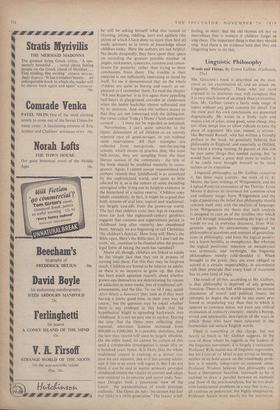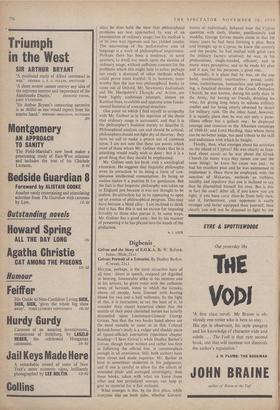Linguistic Philosophy
MR.. GELLNEWS hook is described on the dust- cover as 'an examination of, and an attack on, Linguistic Philosophy.' Those who are most exposed to its strictures may well complain that it is very much more of an attack than an examina- tion. Mr. Gellner covers a fairly wide range If topics without any great concern for detail. For the most part his own conclusions are presented dogmatically. He writes in a lively style and makes a lot of jokes, some good, some cheap; they too often tempt him to allow ridicule to take the place of argument. His aim, indeed, is serious: like Bertrand Russell, who haS Written a friendly preface to the book, he genuinely believes that philosophy in England, and especially at Oxford, has taken a wrong turning. In pursuit of this aim he says some things that needed saying; but he would haVe done a great deal more to realise it if he could have brought himself to be more serious in its execution.
Linguistic philosophy, as Mr. Gentler conceives it, has three main sources: the work of G. E. Moore, the later writings of Wittgenstein, and the Logical Positivist movement of the Thirties. From Moore it derives its reverence for common sense and ordinary usage, from Wittgenstein and the logical positivists the belief that philosophy should concern itself only with the analysis of language. from Wittgenstein the thesis that such analysis is designed to cure us of the troubles into which we fall through misunderstanding the logic of the words we use in everyday discourse, from Witt- genstein again its unsystematic approach to philosophical questions and mistrust of generalisa- tions in philosophy, and from the logical positiv- ists a latent hostility to metaphysics. But whereas the logical positivists' rejection of metaphysics was systematic and forthright, the linguistic philosophers merely cold-shoulder it. When brought to the point, they are even obliged to accord it a certain respectability, in accordance. with their principle that every kind of statement. has its own kind of logic.
The result of all this, according to Mr. Gentler, is . that philosophy is deprived of any genuine
function. There is no link with science; no serious discussion of moral and political issues; no attempts to depict the world in any more pro- found or stimulating way than that in which it appears to common sense; not even any critical evaluation of ordinary concepts: merely a boring, trivial and unscientific description of the ways in .which those who have been educated in the humanities use certain English words.
There is something in this charge, but not nearly so much as Mr. Gellner suggests. In the case of those whom he regards as the leaders of the linguistic movement, it is largely a caricature. Professor Ryle makes use of linguistic arguments,.
but his Concept of Mind is not trivial or boring;
neither in its bold attack on the'mind-body prob- lem is it unduly subservient to common sense.
Professor Wisdom believes that philosophy can have a therapeutic function, inasmuch as he is inclined to draw a parallel between its methods and those of the psychoanalysts; but he ton deals with fundamental problems in a way that is not all cautious or pedestrian, but highly imaginative. Professor Austin more nearly fits the stereotype. since he does hold the view that philosophical' problems are best approached by way of an examination of ordinary usage; but his method is in its own way rigorous and has yielded results. The uncovering of the performative uses of language is a work of philosophical importance. Perhaps there has been a tendency, in some quarters, to dwell too much upon the niceties of ordinary usage, without sufficient concern for the problems which this might help to solve; perhaps too ready a dismissal of other methods which could prove more fruitful. It is, however, note- worthy that the last two philosophical books to come out of Oxford, Mr. Strawson:s Individuals and Mr. Hampshire's Thought and Action, are both highly ambitious attempts, almost on Kantian lines, to exhibit and appraise some funda- mental features of conceptual structure.
One point on which I find myself in sympathy with Mr. Gellner is in his rejection of the thesis that ordinary usage is sacrosanct, and that it is the philosopher's business merely to describe it. Philosophical analysis can and should be critical; philosophers should not fight shy of theories : they have no call to make a prison out of common sense. I am not sure that these are points which most of those whom Mr. Gellner thinks that he is attacking would really wish to deny: but it is a good thing that they should be emphasised.
Mr. Gellner ends his book with a sociological excursion. He suggests that linguistic philosophy owes its attraction to its being a form of Con- spicuous intellectual consumption. Its being so useless makes it a pastime fit for gentlemen. But the fact is that linguistic philosophy was taken up in England just because it was not thought to be useless. Its attraction lay in its appearing to open up an avenue of philosophical progress. This may have become a blind alley: I am inclined to think that it has. But this is not an excuse for imputing frivolity to those who pursue it. In some ways, Mr. Gellner has a good case: but by his manner of presenting it he has played into the hands of the philistines.
A. J. AYER







































































 Previous page
Previous page